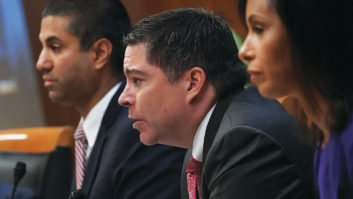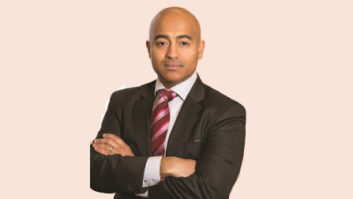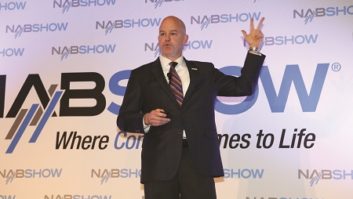FCC Commissioner Michael O’Rielly spoke at the fall Radio Show in Atlanta. The current issue of Radio World includes final news coverage of the show themes. Here are his remarks as prepared for delivery.

Commissioner Michael O’Rielly spoke about FCC issues in Atlanta. Separately, shown here, he also helped out at the presentation of the NAB Marconi Awards.
Credit: © NAB Broadcasting in general, and radio in particular, are on everyone’s mind at the commission. Topics like pirate radio enforcement, AM revitalization and other reforms to lighten regulatory burdens on the industry are finally on their way to receiving proper attention.
PIRATE RADIO
As many of you know, my thoughts on the subject of pirate radio are pretty clear-cut. I view the protection of licensed spectrum from harmful interference as one of the fundamental obligations of the FCC.
Far from being cute, harmless or even somehow useful, pirate radio represents an attack on the integrity of our airwaves. Broadcasters from many states have been working hard this year to bring much needed attention to this serious problem and provoke a stronger enforcement campaign by the commission. And as a result, we recently committed to develop a comprehensive policy and enforcement approach to pirate radio in collaboration with outside stakeholders.
Such a commitment is all well and good, but without continuing pressure the promised document will remain “in development” and enhanced enforcement efforts in a holding pattern for a long time to come. That’s why, last week, I published my own draft policy statement to get the ball rolling and hopefully inspire others to join the dialogue. As summer has turned into fall, we need to make it a priority to come to an agreement before Halloween, or at the latest, Thanksgiving. It’s time to put together a game plan and start executing.
The commission should make clear that any unauthorized operation within the FM and AM bands is strictly prohibited, and put into action an enforcement plan designed to disrupt and terminate all pirate radio stations. In order to do this most effectively, the commission will need to attack these operations at their core, through limitations on funding and housing, until no one wants to work with them again.
Today, pirate operators are being enabled by building owners and managers, product advertisers and political campaigns, concert promoters and venue operators, and many other entities. The vast majority of legitimate companies and associations, however, want nothing to do with facilitating illegal activities. So we need an education component to make it less likely that anyone in the chain knowingly or unknowingly assists pirate radio operations in any capacity.
Moreover, within the realm of our authority, there is a lot we can do to bust up pirate radio stations, including collaborating with federal, state and local law enforcement, and other local authorities. For instance, I doubt most buildings are zoned for broadcasting purposes, certainly not in residential areas with children, so let’s work with local building inspection officials. In most instances, these stations are not hiding; we know the exact locations of their operations. Heck, the New York State Broadcasters Association mapped out the illegal stations in New York and New Jersey and all the commission needs to do is show up at those addresses to serve the papers.
Critics have argued that this approach is naïve, and it will not have any impact on pirate radio stations. Until someone puts out a better plan, beyond appeasement or huge increases in enforcement personnel, I suggest we pursue these actions with a willingness to adapt as necessary. At the same time, we need to explore targeted and narrow changes in federal law to expand the commission’s authority in this area.

credit: iStockphoto/serkorkinAM RADIO REVITALIZATION
Switching topics, let me turn to the state of AM radio and the commission’s efforts to revitalize the band.
I know this is of great interest to many of you, especially since it has been a long time coming. The good news is that the wait is almost over and the commission is preparing to make some decisions; the bad news — and I am only referencing press reports because I am prohibited from sharing the contents of any circulating item — is that not all of the previously proposed fixes are in play. If these reports are accurate, certain people at the commission oppose an AM-only translator window through which AM stations could obtain translators to operate in the FM band.
Before I get too far into substance, it is only appropriate to acknowledge the work of others on this issue since I came to the commission in the middle of the debate. Specifically, we would be nowhere without the leadership of my colleague, Ajit Pai. I like to say that Commissioner Pai knows more about AM radio than I ever will. In addition, I should recognize the work of my other colleague, Commissioner Mignon Clyburn, during her time as acting chair, to get us to this point.
Fundamentally, the question of opening an AM translator window comes down to whether one supports the concept of AM radio and its revitalization as necessary in order to serve as a communications medium for the American people.
In other words, should the commission try to ensure a future for AM radio or should we let nature take its course as this band continues to decline in many markets? Are AM stations financially struggling to the point of threatening their existence? Differing minds could have different opinions, but if AM radio deserves help and revitalization via FCC policy changes, then broadcasters have always been clear: The AM translator issue is the number one solution, and everything else is a far distant second. So the question is how can it be left out of any package of reforms?
This audience certainly knows the value and benefits of translators. In this case, an AM translator window could help solve the nighttime shutdowns or reductions in power required of some AM stations. It also would allow some stations to serve a greater portion of their communities. And greater market reach and longer service times mean increased likelihood of achieving financial viability.
The arguments against this proposal have been interesting, to say the least. It’s been described by some as a spectrum giveaway, which seems quite ironic given the commission’s creation of a spectrum “reserve” to tilt the broadcast incentive auction outcome in favor of certain companies. But in order to figure out whether an AM translator window would be fair, all you have to do is talk to potential competitors. If this were an unwarranted action not needed to save AM radio, outside parties that could be harmed would be expected to complain. Instead, I’ve talked to a number of radio owners that own FM-only stations and those that own both AM and FM stations. These are the most likely to oppose AM radio getting translators over FM stations or anyone else. Yet, to a person, those owners support an AM-only window. It may not be in their financial interest to do so, but they see the value of AM radio and want to see AM stations succeed. This should mean something to the commission.
The bottom line: If there is agreement that it is important to revitalize and maintain an AM broadcast band, and set this as a public policy goal, we should take efficient and effective action. I am not sure it is helpful to implement a list of smaller measures that will have only so much value in the scheme of things, while rejecting an idea that many argue is really necessary.
REGULATORY REFORM
Some of you may have heard me speak at other broadcaster events this year about a shift in emphasis that has the potential to supercharge your efforts to improve the regulatory environment for your businesses.
In a vast, abundant marketplace with ever-expanding options for audio and video content, broadcasters must constantly change to compete, and as this process plays out it is only fair that your obligations be constantly revisited as well. With this strategic adjustment, it will be possible to move beyond calls for regulatory parity based on more burdens for various players, and center instead on a model of fewer burdens for all.
There are so many elements of the regulatory landscape that have completely outlived their utility in today’s hypercompetitive entertainment world, and you shouldn’t have to take them as given. Recent success in modernizing the contest disclosure rules shows what can be accomplished with the right focus. We have seen that common sense really can eventually win the day, and by sticking with this approach I think it will be possible to catalyze many more badly-needed reforms in areas such as sponsorship ID, EEO compliance in recruiting, and — who knows? — maybe even the positively archaic media ownership rules.
As always, I greatly appreciate your willingness to work with me, and I welcome your thoughts and input on the challenges you are facing and ways I can help. As the commission moves forward on these and other policy initiatives, your continued engagement will help shape the outcome in important ways.










